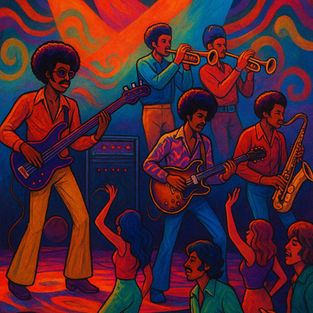
Photo- AI Generated
The Singer-Songwriter Movement of the 1970s
In the 1970s, music underwent a quieter revolution — one that swapped the electrifying spectacle of arena rock for something intimate and emotional.
5 August 2025
The Singer-Songwriter Movement wasn’t about flashy riffs or elaborate stage shows. It was about storytelling — raw, personal, and profoundly human. This was music written from the heart and often performed by the very hands that penned the lyrics.
The Roots of the Movement
While the term “singer-songwriter” had existed before, the 1970s solidified the genre as a cultural force. Its seeds were sown in the folk revival of the ‘60s, with artists like Bob Dylan, Joan Baez, and Leonard Cohen laying the foundation. But in the ‘70s, this style grew wings, as introspection became a form of rebellion — not against governments or war, but against emotional suppression and mass-produced identity.
The 1970s were a time of disillusionment. The idealism of the '60s had cracked, and Watergate, Vietnam, and cultural shifts left a generation seeking meaning within themselves. Singer-songwriters gave voice to this inner world, often performing solo or with minimal backing, letting lyrics and melodies carry the weight.
The Voices of a Generation
Some of the most iconic and enduring music of the decade came from this movement. Joni Mitchell, with albums like Blue, gave us confessional songwriting that felt like eavesdropping on someone’s journal. Her music was poetic, vulnerable, and beautifully complex.
James Taylor brought warmth and reassurance, his soothing voice and fingerpicked guitar creating an emotional balm in songs like "Fire and Rain" or "Carolina in My Mind." Meanwhile, Carole King’s Tapestry became a cultural cornerstone, combining personal lyricism with chart-topping pop craftsmanship.
Jackson Browne, Cat Stevens, Jim Croce, Carly Simon, Harry Chapin, and John Denver also emerged as powerful voices — each offering their version of lyrical honesty. They weren’t trying to be rockstars in the traditional sense; they were storytellers with guitars, pianos, and aching hearts.
Themes of Intimacy, Vulnerability, and Truth
The hallmark of the singer-songwriter genre was emotional authenticity. These were not songs written by committee — they were often autobiographical, touching on love, heartbreak, anxiety, depression, personal growth, and political disillusionment.
The music was stripped down, making it feel personal — almost like the artist was sitting in your living room. This accessibility created strong emotional bonds between the artist and listener. You didn’t just listen to these musicians — you felt them.
Production and Sound Aesthetic
Unlike the grand productions of glam or prog rock, singer-songwriter records embraced simplicity. Acoustic guitars, pianos, and soft percussion dominated. Many of these albums were recorded with a focus on capturing emotion over perfection. This lo-fi, intimate production aesthetic became part of the charm.
While some incorporated orchestration or backing bands (like the L.A.-based session group The Section), the spotlight never left the voice and the story being told.
Cultural Impact and Legacy
The influence of the 1970s singer-songwriter movement is far-reaching. It reshaped the definition of pop music, paving the way for more personal narratives in mainstream music. It also empowered artists to take control of their creative process — writing, composing, and often producing their material.
Today, artists like Taylor Swift, Bon Iver, Phoebe Bridgers, and Ed Sheeran owe a debt to this era. The lineage of confessional, emotionally driven songwriting is still very much alive in indie, folk, and pop.
The Enduring Power of the Personal
In a decade bursting with musical experimentation and cultural turbulence, the singer-songwriter movement stood out not through volume or spectacle but through its quiet courage. These artists opened their lives to the public and invited us to reflect on our own in return. They proved that vulnerability could be revolutionary — and that sometimes, the softest voices echo the loudest.









